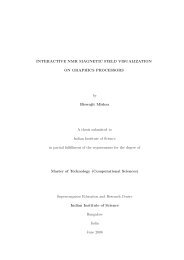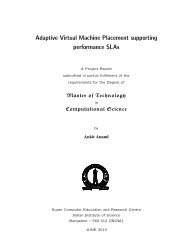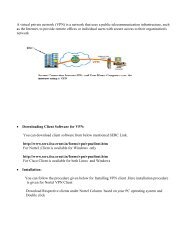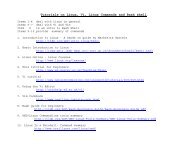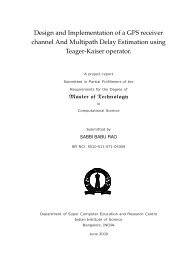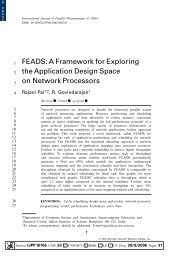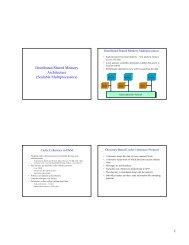MATLAB Mathematics - SERC - Index of
MATLAB Mathematics - SERC - Index of
MATLAB Mathematics - SERC - Index of
Create successful ePaper yourself
Turn your PDF publications into a flip-book with our unique Google optimized e-Paper software.
5 Differential Equations<br />
Troubleshooting (Continued)<br />
Question<br />
I’m plotting the solution as<br />
it is computed and it looks<br />
fine, but the code gets stuck<br />
at some point.<br />
Answer<br />
First verify that the ODE function is smooth near the point<br />
where the code gets stuck. If it isn’t, the solver must take small<br />
steps to deal with this. It may help to break tspan into pieces on<br />
which the ODE function is smooth.<br />
If the function is smooth and the code is taking extremely small<br />
steps, you are probably trying to solve a stiff problem with a<br />
solver not intended for this purpose. Switch to ode15s, ode23s,<br />
ode23t, or ode23tb.<br />
My integration proceeds<br />
very slowly, using too many<br />
time steps.<br />
First, check that your tspan is not too long. Remember that the<br />
solver uses as many time points as necessary to produce a smooth<br />
solution. If the ODE function changes on a time scale that is very<br />
short compared to the tspan, the solver uses a lot <strong>of</strong> time steps.<br />
Long-time integration is a hard problem. Break tspan into<br />
smaller pieces.<br />
If the ODE function does not change noticeably on the tspan<br />
interval, it could be that your problem is stiff. Try using ode15s,<br />
ode23s, ode23t, or ode23tb.<br />
Finally, make sure that the ODE function is written in an<br />
efficient way. The solvers evaluate the derivatives in the ODE<br />
function many times. The cost <strong>of</strong> numerical integration depends<br />
critically on the expense <strong>of</strong> evaluating the ODE function. Rather<br />
than recompute complicated constant parameters at each<br />
evaluation, store them in globals or calculate them once and pass<br />
them to nested functions.<br />
I know that the solution<br />
undergoes a radical change<br />
at time t where<br />
t0 ≤ t ≤ tf<br />
but the integrator steps<br />
past without “seeing” it.<br />
If you know there is a sharp change at time t, it might help to<br />
break the tspan interval into two pieces, [t0 t] and [t tf], and<br />
call the integrator twice.<br />
If the differential equation has periodic coefficients or solution,<br />
you might restrict the maximum step size to the length <strong>of</strong> the<br />
period so the integrator won’t step over periods.<br />
5-48



